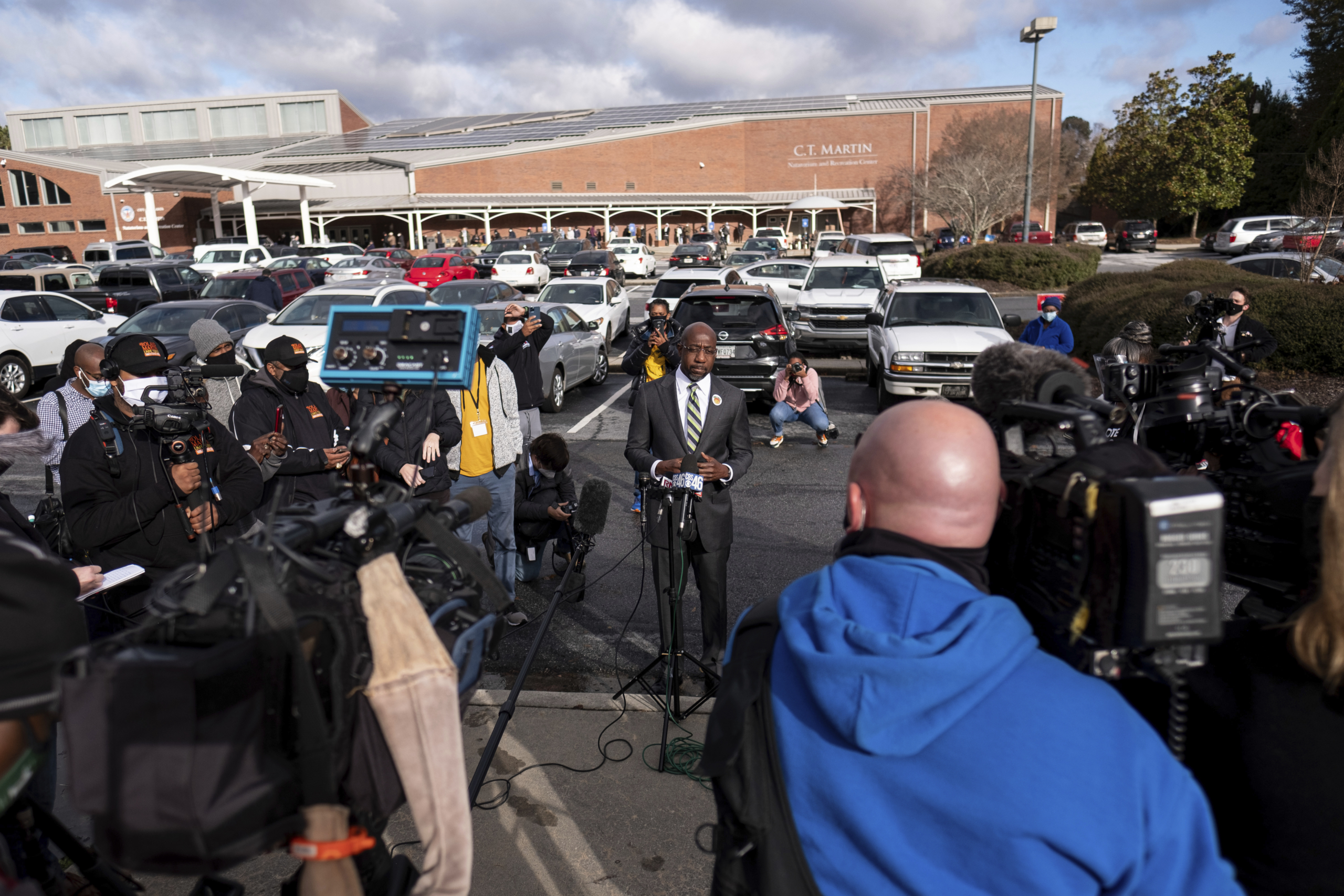Last January, when the Reverend Raphael Warnock entered Georgia’s US Senate race against Kelly Loeffler, an incumbent Republican, Tia Mitchell and Shelia Poole knew right away that his sermons would be mercilessly picked apart. (He’d once defended an infamous line from Revered Jeremiah Wright: “Not ‘God bless America,’ God damn America!”) Mitchell, the Atlanta Journal-Constitution’s correspondent in Washington, and Poole, the paper’s religion reporter, got to work early on stories about Warnock’s background and the context of his statements, writing that his aim was to address “the failings of the United States to protect its most vulnerable citizens, including African Americans and Native Americans.”
Their reporting predicted what has now become routine: diatribes against Warnock by political opponents who have labeled him a socialist bent on spreading radical ideas from the pulpit. “The ‘Black church’ has your activists, your politically outspoken liberation theology lectures—and that was familiar to us,” Mitchell said. She and Poole grew up in and around Black congregations. “We could, with authority, craft this article to explain where Reverend Warnock is coming from.”
Mitchell and Poole are among the Black reporters in Georgia who have been covering a critical election with critically needed perspective—the kind that reflects the importance of Black voters, who will largely decide this week’s runoff. They are in the minority, however, among journalists covering Georgia—a political story that has attracted attention far and wide since the state swung blue after twenty-four years in the red column. Now Georgia will be decisive to the balance of power in the Senate.
Rana Cash—the executive editor of the Savannah Morning News, and the first Black journalist to hold that position—believes that Black reporters are uniquely positioned to cover the concerns of their communities and to hold elected officials accountable for serving them. “We want to ask people: ‘If this candidate wins, what does that mean for you?’ And that also means asking that question of people of color more broadly,” she said. But Cash, when she was hired last June, was one of just two Black staffers at the News—serving a city that is 54 percent Black. When she arrived, she quickly recognized a need to correct the disparity in representation, writing, “On matters of race, our newsroom has fallen short.” She committed to hiring more people of color; the first was a Black investigative reporter who has been tasked with contributing political stories.
When journalists covering the election are unfamiliar with the people living in districts that will be pivotal to the outcome, they may miss that Georgia’s suburbs, once predominantly white, have been rapidly diversifying, and that grassroots voter registration efforts have spent decades building turnout in those communities. “A lot of the coverage tends to overlook that this isn’t some sudden thing that just happens,” Anoa Changa, a freelancer writer focused on electoral justice and movement journalism in Georgia, said.
Changa—who previously worked as an activist with a voter registration group called the New Georgia Project—has been dismayed by the ways she sees national coverage oversimplifying voter organizing or drawing false equivalences between anti-voter-suppression efforts and voting vigilante groups like Truth to Vote, which aim to disenfranchise Black and Latinx voters. At one point, she said, a white reporter asked her if the New Georgia Project would hold a registration event in a conservative rural community—a scene that could make for a “balanced” story, but would misrepresent her organization. “White reporters are more likely to buy into this need to be neutral observers,” Changa said.
Black journalists, she went on, are not just covering events but are also stakeholders in the policies that weigh on Black families after the political press has packed up. “That doesn’t mean I’m a mouthpiece or armed automatically with a megaphone,” Changa explained. “But at the same time, we—Black Georgians—have particular interests that are, more often than not, not showcased and amplified in the media.”
The madness of election cycle reporting doesn’t leave much room for an integrated network of civic engagement that helps bring historically marginalized people into the fold. At national outlets, Mitchell said, there has been progress—she cited high-profile Black journalists, such as Yamiche Alcindor, Astead Herndon, Abby Phillip, and Errin Haines, whose perspectives have enriched the coverage of the runoff. But on the local level, Mitchell finds herself part of a too-small cohort of Black reporters following Georgia politics.
Mitchell, Poole, Changa, and their colleagues are doing what they can to make space for the experiences of Black Georgians in their coverage—working not only to track instances of disenfranchisement and racially targeted attacks on mail-in ballots, but also to provide clear guidance to Black and Latinx voters. It’s a task that runs up against a history of news reporting, especially at legacy publications like the Journal-Constitution, that hasn’t always been serious about serving Black voters. And writing about them is one thing; earning engagement from Black readers is another. “When we show up now wanting Black people to trust us? Well, it’s been ingrained in them that legacy media cannot be trusted,” Mitchell said. She’s suggested that her newsroom publicly acknowledge the harm of its past coverage of Atlanta’s Black communities, as other papers have done. “The AJC so far has not done it,” Mitchell said. “But they know that’s my wish.”
Editor’s Note: This article has been updated to correctly attribute a quote from a sermon.
Feven Merid is CJR’s staff writer and Senior Delacorte Fellow.

